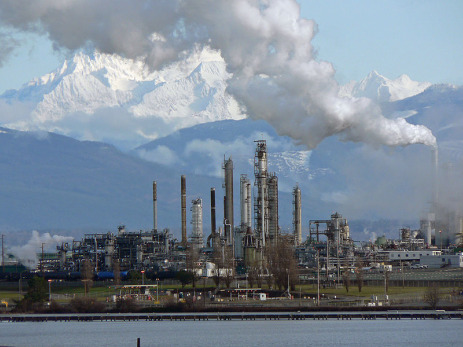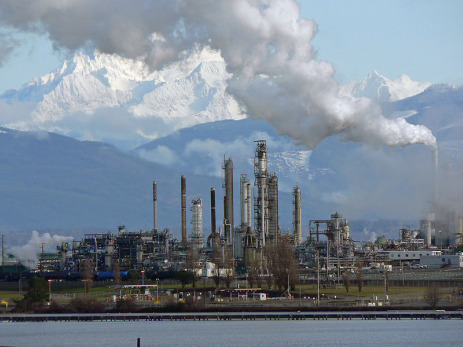The American oil industry is booming. (Not literally, you’ll be happy to know.) Which means that, with a bit of a lag, the fossil-fuel-refining sector is booming, too.

Boom times in the refinery business.
From The New York Times:
[T]he pipeline that once brought foreign oil from the gulf port of Corpus Christi to Three Rivers has been reversed, sending Texas crude to other refineries along the coast for processing into diesel and other products for export far and wide, from Mexico to the Netherlands.
The drilling boom has allowed many refiners to buy crude at a huge discount — sometimes $20 or more a barrel — below international benchmark prices. That is especially true for refineries that operate in the core of the country, where there is a glut of crude from the North Dakota Bakken shale formation because of insufficient pipelines. Historically, until the last couple of years, American crudes typically were priced 50 cents to a dollar higher than international crudes.
The price advantage of United States refiners over their foreign competitors helped the country last year become a net exporter of refined petroleum products for the first time since the late 1940s, producing nearly $10 billion in annual revenue from daily net exports of 370,000 barrels a day of gasoline and diesel.
Over the first eight months of this year, according to the Energy Department, those net exports have surged to 975,000 barrels a day.
More oil and refined oil products means more need to move the stuff around. Pipeline manufacturers are also expanding in the new oil economy. The Financial Times:
Tenaris, the Luxembourg-based steel tube manufacturer, is close to a decision on a site for its new $1.5bn US plant in the Gulf of Mexico region, in the latest sign of the revival in US industry driven by the boom in shale oil and gas production.
The plant, an integrated steel mill producing seamless pipes for the oil and gas industry, will employ up to 4,000 people while under construction and an estimated 600-800 when in operation.
Scheduled to come on stream in 2016, it will add about 10 per cent to Tenaris’s global manufacturing capacity, serving customers in the US and potentially Mexico and Canada. North America is the company’s largest market, accounting for about 50 per cent of sales.
Meanwhile, the boom in production and piping may end up being the best argument against building the Keystone XL pipeline yet. Inside Climate News, via Midwest Energy News:
Within the U.S. oil industry, however, the hot topic these days is not the nation’s need to import Canadian oil–it’s the possibility of exporting crude oil produced in the United States. …
That expectation is causing the industry to make massive investments to reconfigure North America’s pipeline network and change the way oil has been flowing for decades. …
To export U.S. crude, sellers have to contend with a patchwork of overlapping restrictions that makes it illegal to export U.S. crude to any foreign country without government permission and special licenses.
In the past, only a trickle of U.S. crude flowed out of the country through these licenses. But that’s changing. In July, producers exported 77,000 barrels per day of U.S. oil to Canada–the highest level in more than a decade, according to federal statistics. Royal Dutch Shell, BP, oil trader Vitol and three other companies have applied for or received the necessary government clearance to export domestic crude oil–mainly, if not exclusively, to Canada–according to recent news reports. …
The notion that the Keystone XL is needed for U.S. energy security persists even as a succession of experts acknowledge that the pipeline’s primary target market–the Gulf Coast refining hub–is already well-supplied and will reach glut levels as more U.S. oil flows to the region.
Finally, back to the Times, for a word of warning.
[The refining sector] has been historically volatile, and some analysts caution that the refiners are vulnerable to any economic downturn, either globally or in the United States, and higher natural gas prices that could be caused by a cold winter.
We’d also point out that the Texas Gulf Coast is susceptible to erosion and rising sea levels as a result of the climate change all that oil will accelerate, but nobody likes a Debbie Downer. Go oil! Build pipes! USA! USA!




